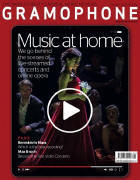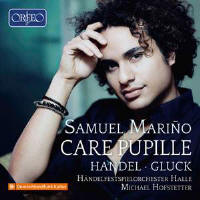Texte paru dans: / Appeared in: |
|
|
Outil de traduction (Très approximatif) |
|
|
Reviewer:
Richard Wigmore
Since Alfred
Deller was ‘discovered’ by Michael Tippett in the 1940s, countertenors have
tended to get higher and louder. Many of today’s star falsettists – Philippe
Jaroussky, Max Emanuel Cencic, Franco Fagioli – have the compass of a female
mezzo. Higher still, the 27-year-old Venezuelan Samuel Mariño is an unequivocal
soprano whose repertoire goes beyond the Baroque to include Oscar in Verdi’s
Un ballo in maschera and Fiorilla in Rossini’s Il turco in Italia. For his
debut CD he has alighted on (mainly) rare Handel and even rarer Gluck, in roles
composed for either soprano castratos or (Berenice in Gluck’s Antigono)
women. Mariño’s flutey, feminine timbre (though you’d hardly mistake him for a
female soprano), agile coloratura and ease above the stave immediately impress
in a frisky aria from Handel’s Berenice. In a rapt ‘Care selve’ from
Atalanta he displays his command of messa di voce – the gradual
swelling and ebbing of tone that was a touchstone of an 18th-century singer’s
technique – and a true trill, another 18th-century must-have. Mariño is good at
refined delicacy, as in ‘Già che morir’ from Gluck’s Antigono, later
reworked as ‘Che puro ciel’ in Orfeo. (Like Handel, Gluck was an
inveterate recycler.) Aptly for a man contemplating death, he sings this in a
fragile, haunted pianissimo, the top Cs gently brushed within the melodic
line.
In extrovert
mode Mariño finds a metallic glint in the tone, whether jousting with solo oboe
in a virtuoso showpiece from Handel’s Arminio or vowing to risk his life for
love in ‘Care pupille’ from Gluck’s Il Tigrane – a brilliant performance
of the aria that gives the disc its title. He reveals plenty of temperament,
too, in a superb scena from Gluck’s Antigono whose fast section draws on
the gigue from Bach’s B flat Keyboard Partita and later turns up as Iphigénie’s
‘Je t’implore, et je tremble’ in Iphigénie en Tauride. Here and elsewhere
the Halle period band give punchy, rhythmically precise support. Reservations? Mariño is hardly shy over ornamentation, some of which, especially in cadenzas, seems self-regarding. When he ups the volume for intensity his vibrato can become intrusive – something to beware of in a young singer. At times, too, Mariño overdoes the dreamy languor, as in a graceful if overlong aria from Gluck’s La Sofonisba. He might also learn a thing or two from Cecilia Bartoli, in her Gluck album (Decca, A/01), about colouring and projecting Italian words. But this is an accomplished, often exciting debut from a singer who must count as something of a vocal phenomenon. Orfeo’s presentation includes plenty of photos of the visually marketable Mariño plus a decent booklet essay, but, true to form, no texts and translations. Nor will you find them online. Even if you have good Italian, you’ll only pick up the general gist of what these arias are about. Depressingly predictable, but galling nonetheless.
|
|




